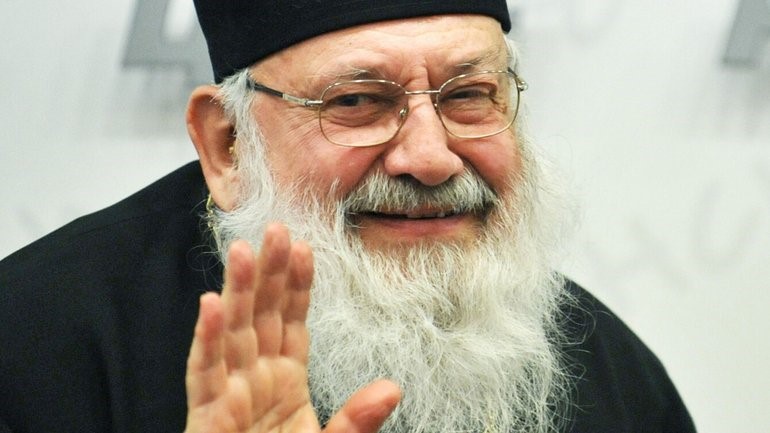Ljubomyr Husar's beatification process opened in Kiev
Six years after his death, the canonical investigation into the sanctity of the Major Archbishop of the Uniates buried in the Cathedral of the Resurrection, hit by Russian missiles, has been solemnly opened. A native of Lviv, forced into exile by the tragedies of the 20th century, from 2001 he led the Greek Catholics through delicate years with profound wisdom and capacity for dialogue.
Kiev (AsiaNews) - On 26 February the major archbishop of Kiev of the Ukrainian Greek-Catholic Church, Svjatoslav Ševchuk, solemnly proclaimed the start of the beatification process of his predecessor, Archbishop Ljubomyr Husar, on the day of the 91st anniversary of his birth. The opening decree underlines how in the six years that have passed since his death, which occurred in Kiev on 31 May 2017, "the strength of his word and his spirit have continued to serve as orientation and support for people in daily life, especially in the days of the terrible war we are experiencing."
The body of "Patriarch Ljubomyr", as he is called by his Greek-Catholic faithful, rests in the Cathedral of the Resurrection of the Lord in Kiev, hit by Russian missiles in the first days of the invasion of Ukraine, but miraculously remained almost intact. After his passing, the decree further observes, "the people of God immediately began to demonstrate a particular devotion to his person, not so much praying for his eternal peace, but rather asking for his intercession and bearing witness to the glory of his holiness, through the numerous writings placed in the book of memory next to his tomb, which attest to the many signs, mercies and healings received".
The collection of documentation for the trial began with the many requests from the people and communities of Ukrainian believers, reporting directly to the archeparchy of the Greek Catholic Church, which has the ex officio faculty over the canonical procedures of its jurisdiction, to which it reports following the competent Vatican departments.
Archbishop and Cardinal Husar was born in 1933 in Lviv, where he spent his childhood years, and then fled with his family in 1944, following the war events, taking refuge in Salzburg in Austria, where he attended the gymnasium organized by Ukrainian emigrants. In 1949 he moved to the United States with his parents and older sister, entering the minor seminary in Stamford, Connecticut, to conclude his theological studies in Washington until his priestly ordination celebrated in 1958 by Msgr. Ambrose Senyshin, of the Stamford eparchy of the Ukrainians.
In 1969 he moved to Rome, defending his doctoral thesis on the figure of Metropolitan Andrej Šeptyckyj, Ukrainian apostle of ecumenism in the first half of the 20th century. He entered the monastery of the Ukrainian Studites in Grottaferrata, the ancient Byzantine rite monastery which was and still is a point of reference for every meeting between East and West in the Catholic Church on the outskirts of Rome. Until the disappearance of the Soviet Union, the community of Ukrainian monks remained in this place, safeguarding and spreading the liturgical, spiritual and cultural traditions of the "Uniates", the Catholics of the Eastern rite who since the end of the 16th century have been among the main representatives of Ukrainian identity, of which Husar was one of the main teachers and witnesses.
In 1985, after the death of the heroic Cardinal Josyf Slipyj, who was also in exile in Rome in the Ukrainian cathedral of Hagia Sophia after almost twenty years of Stalin's concentration camp, Husar became "Protosyncello", vicar general of the major archbishop Myroslav Lubachivsky , who returned to Ukraine on 30 March 1991, taking possession of the headquarters of Lviv in 1991. Husar then succeeded him ten years later, on 25 January 2001. After another decade he was replaced by Ševchuk, who transferred the main headquarters of the Greek- Catholics in the capital Kiev.
Archbishop-patriarch Husar governed the Church in Ukraine in one of the most delicate phases, the beginning of the 2000s, when the country's fate remained in the balance between conflicting forces of politics and the ecclesiastical life of Catholics and Orthodox. Everyone remembers him as a man of profound wisdom and capacity for dialogue, who was able to transmit the truths about the nature of the Church, which he taught for years at the Urbaniana University, not as chapters of an abstract doctrine, but as experiences of life and of rebirth of faith, after much suffering and persecution, to prepare to face many other trials of history.
14/05/2019 15:38
02/06/2017 10:02
08/08/2016 15:33
26/01/2022 09:40
26/05/2017 14:58







.png)










